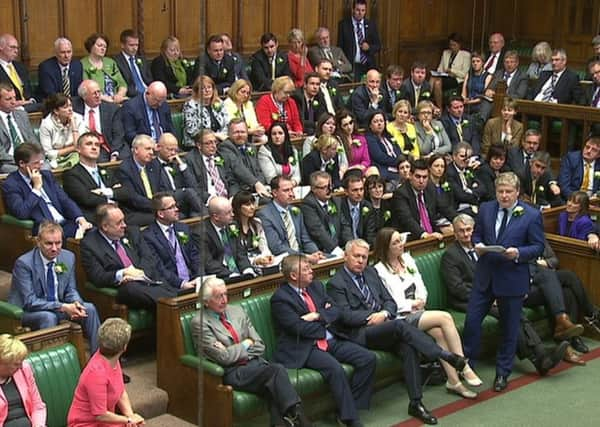Tom Peterkin: SNP could learn from Irish politics


The ghost of Charles Stewart Parnell may not quite be stalking the corridors of Westminster, but his name did come up in this week’s debate on the Scotland Bill.
The SNP MP Ian Blackford quoted the infamous Irish Nationalist politician of the 19th century when arguing (without success) for Holyrood to be given power over future independence referenda.
Advertisement
Hide AdAdvertisement
Hide Ad“No man has the right to fix the boundary to a march of a nation. No man has the right to say thus far shalt thou go and no further,” was the Parnellian pearl of wisdom produced by Blackford.
It is one of the SNP’s favourite quotations, adorning party literature while reminding readers that Parnell is one of Alex Salmond’s heroes. Before this year’s general election, comparisons between the SNP and Parnell were thick on the ground as politicians and academics contemplated a Nationalist party holding the balance of power at Westminster in the way that his Irish Party once did. The comparisons were hardly discouraged by Salmond pledging to hold Westminster’s feet to the fire – a phrase redolent of Parnell talking of his party having “a knife to the throat of Westminster” when Ireland was still in the Union.
One individual to compare the two eras was Jim Gallagher, visiting professor at Glasgow University, who went as far as writing an erudite paper for Oxford University’s Nuffield College on the subject. In it, Gallagher observed that the idea of a “progressive alliance” between the SNP and Labour was being “touted today” just as it was between Irish Nationalists and the Liberals 100 years ago.
“In both cases the nationalists’ motivation was, and is, to gain greater autonomy by whatever the available means,” Gallagher wrote.
As things transpired the SNP were ultimately unable to match Parnell in terms of holding the balance of power. By returning 56 MPs the SNP could not have done much more. It was Labour’s poor performance that scuppered the Nationalist dream of turning kingmaker at Westminster.
Despite failing to emulate Parnell, the SNP is still managing to make its presence felt – most recently this week when Nationalist MPs forced the UK government to shelve plans to extend Sunday trading hours in England and Wales when Salmond et al indicated they would block them in the House of Commons. Nevertheless the fact remains that the arithmetical make-up of the House of Commons prevents the SNP from indulging in the scale of disruption that characterised Parnell’s attempts to further his cause.
The failure of a directly comparable situation to emerge has not discouraged Gallagher from continuing to look at Scotland and Ireland’s constitutional wranglings. In a more recent lecture, he argued that last year’s referendum for “all the talk of pious talk of democratic engagement” was “a deeply divisive process”. Arguing that Ireland offered a “cautionary tale”, he said post-referendum Scotland should do its utmost to avoid the situation that has seen division over the 1921 Anglo-Irish Treaty entrenched to the extent it defines the politics of Fine Gael and Fianna Fail to this day. Of course, Scotland has been spared the violence that resulted from the Irish political divide. There is still, however, a need for divisions to be healed. One way of doing that, believes Gallagher, is to avoid another referendum.
“Instead of forcing another binary choice on people, leaving them just as divided, we should be looking for a constitutional settlement that satisfies as many people as much as possible,” was how he put it. According to Gallagher, the new powers offered by the Scotland Bill offer that opportunity. One wonders what Charles Stewart Parnell would have thought of that.